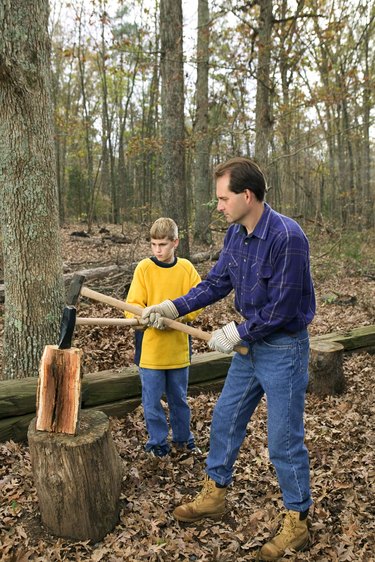Things You'll Need
Tape measure
T-square
3/4-inch steel plate
Acetylene torch
140-amp stick welder
Hydraulic car jack

Log splitters have been around since early farmers used a baler to split wood. They used the PTO drive on a hay baler to push a piece of wood against a steel blade. In recent years, manufacturers have used that concept to produce powerful wood splitters based on hydraulic-piston pressure. Modern wood splitters are not only efficient but also fast. An entire cord of firewood can be split in several hours. The same principles can be applied to a manual log splitter utilizing the hydraulic pressure of a tire jack.
Step 1
Measure and use an acetylene torch to cut an 18-inch by 42-inch piece of 3/4-inch steel plate. Measure and cut two additional pieces of 3/4-inch steel, 12-by-18 inches.
Video of the Day
Step 2
Measure and cut two triangular pieces of 3/4-inch steel plate. These must be right triangles with two of the lines meeting at a 90-degree angle. Make the sides six inches and the hypotenuse 8 1/2 inches.
Step 3
Lay the large piece of steel flat. Stand one of the 12-by-18-inch piece of steel on its long edge and touching the base of the flat-lying, 18-by-42-inch piece. Weld the two pieces of steel together with a stick welder. Stand the assembly up and weld the two triangular pieces of steel at the adjoining corners of the two large pieces of steel -- as connecting braces.
Step 4
Measure and cut a 6-by-6-inch piece of 3/4-inch steel plate. Weld it flat onto the top, extended surface of the jack piston. Weld the base of the jack to the center of the 12-by-18-inch piece of steel on the inside of the angle connecting it to the 42-inch piece. (The jack will be standing between the triangular braces.)
Step 5
Weld the other 12-by-18-inch piece of steel to the other end of the 42-inch piece of steel in an identical fashion as the other 12-by-18-inch piece. Invert the unit so that the jack is now upside down.
Step 6
Measure and cut two 8-by-8-inch pieces of 3/4-inch steel. Cut an additional piece of 3/4-inch steel that measures 8-by-9 inches.
Step 7
Weld the 8-by-9-inch piece of steel standing on the end plate with the 8-inch side up. Weld the 8-by-9-inch piece of steel in the center of the inside surface of the end plate. Weld the other two 8-by-8-inch plates on either side of the 8-by-9-inch plate, forming a 2 1/4-inch splitting surface. Do a build-up weld in the crevice on either side of the top edge of the 8-by-9-inch piece, forming a single splitting edge.
Tip
Use hardwood blocks to extend the hydraulic piston's reach.
Warning
Wear eye protection when working with metal.
Video of the Day